#the bloodletter
Explore tagged Tumblr posts
Text
OC gif meme
There are a lot of this kind. I wanted to do one just for fun for one of my BG3 characters.
𝘈𝘳𝘥𝘳𝘦𝘺𝘵𝘩 𝘔𝘪𝘻𝘻𝘳𝘺𝘮- 𝘛𝘩𝘦 𝘉𝘭𝘰𝘰𝘥𝘭𝘦𝘵𝘵𝘦𝘳

"The Bloodletter, a surgical maestro and adept infiltrator, is a specialized subclass of the rogue class. Navigating the battlefield with precision, the Bloodletter wields anatomical knowledge to inflict and exploit wounds, seamlessly incorporating surgical skills to leave adversaries bleeding in the wake of their lethal mastery."
[quoted from the mod description: The Bloodletter]
*Describe your character with 5 gifs*
The favourite colour

Maestra of her daggers/ Razor-sharp mind

Life quote:

Unapprochable/ does not like to rely on others/ melancholic

Loves cheese.,. and cigars

Resentful/Vindictive

#personal series#baldur's gate 3#mybg3tavs#dark urge#oc: ardreyth mizzrym#the bloodletter#oc gif meme#oc stuff
5 notes
·
View notes
Text
Court chapters 52-55



Click to see the rest of the snark & image descriptions



Chapter 52
And just like that, everything goes black.
Chapter 52 summary: Time now having been restored, Jikan rounds on Grace and tells her to stop fucking around with time. This leads to an argument between him and Cassia over Cassia’s (and Grace’s) powers to stop time.
However, Grace’s friends are more hung up over the idea that Grace has powers beyond what she’s already discovered about herself. Cassia has to take a time out from her argument to say that she turned back on the gargoyle genes inside of fetus!Grace, but it was an unknown entity that stopped the seed of her demigod powers when she was really young. It’s only recently that those powers have come back on. And as powerful as she is whenever she touches that green string, it’s only a tiny fraction of her true strength.
Jikan eventually tells them to go find something called the tears of Eleos. If she rubs those tears over the string that connects her to the other gargoyles, they’ll be cured from the poison. He tells them that it’s somewhere in Florida and sends them on their way.
Chapter 53
“A taffy shop?” I ask. “The place that holds the magic of one of the most powerful, ancient gods in the world…is a saltwater taffy shop?”
Chapter 53 summary: Jikan sent them to the city/town they needed to be in, and they quickly figure out that they’re in the right place. The next two and a half pages are nothing but them arguing without anything getting resolved. Finally, they look around and they’re like “Why the hell is it in a saltwater taffy shop?!”
Chapter 54
“Have a nice day,” she calls over her shoulders with a laugh that chills my blood.
Chapter 54 summary: They go into the shop, which the narration spends way too much time describing. All of what the shop looks like is instantly forgotten the second you move on, so literally none of it is actually important.
Anyway, there’s this sexy-scary lady behind the counter, but Macy warns Grace not to approach without permission. That none of them know what kind of creature she is, but she’s not to be messed with. Besides, a sign behind the counter tells customers not to approach without permission, too.
So Grace waits. And after too much time has passed, Grace tries to clear her throat. The lady tells them to leave. Finally, Grace walks up to the counter, pleading desperation. The lady asks what kind of taffy Grace wants, and stupidly, Grace says she’ll have one of every flavour. The lady pulls out a big sampler ball, and Hudson gives her a hundred, and to keep the change.
Plot? What plot? Not in the Crave series.
Chapter 55
“What everyone is looking for when they come to St. Augustine, Florida. The Fountain of Youth. This field is how you get to try to earn it.”
Chapter 55 summary: So now they’re out of options, and know that they’re running out of time. They quickly start arguing again, and it’s so fucking tedious to read. Literally nothing of actual value is said, so let’s move on.
Grace decides to open up the door behind the counter, the one that the employee went through after she sold the taffy to Grace. Through the door is a coliseum, and a huge field. The woman shows up, and says that this is how they’re going to earn their way to the Fountain of Youth.
#Crave series#Court (Crave 4)#Chapter 52#chapter 53#chapter 54#Chapter 55#the bloodletter#Grace (Crave)#plot? what plot?#Macy (Crave)#Hudson Vega
0 notes
Text
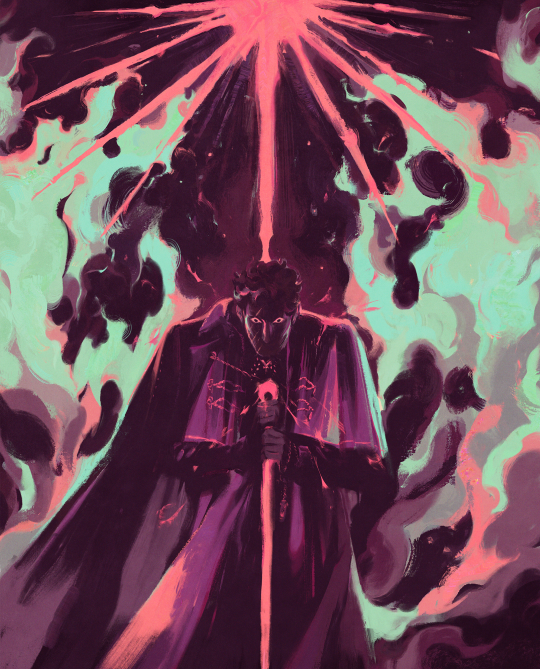
Savior.
a scene from our last Curse of Strahd session featuring my cleric PC
#illstration#art#artists on tumblr#character art#painting#curse of strahd#curse of strahd art#dnd 5e#cleric#dnd art#blood cleric#boy's got kavan's spear and his problematic god turned it into a new thing#basically the bloodletter from bloodborne#kasper dunant#he's good aligned i swear
3K notes
·
View notes
Text
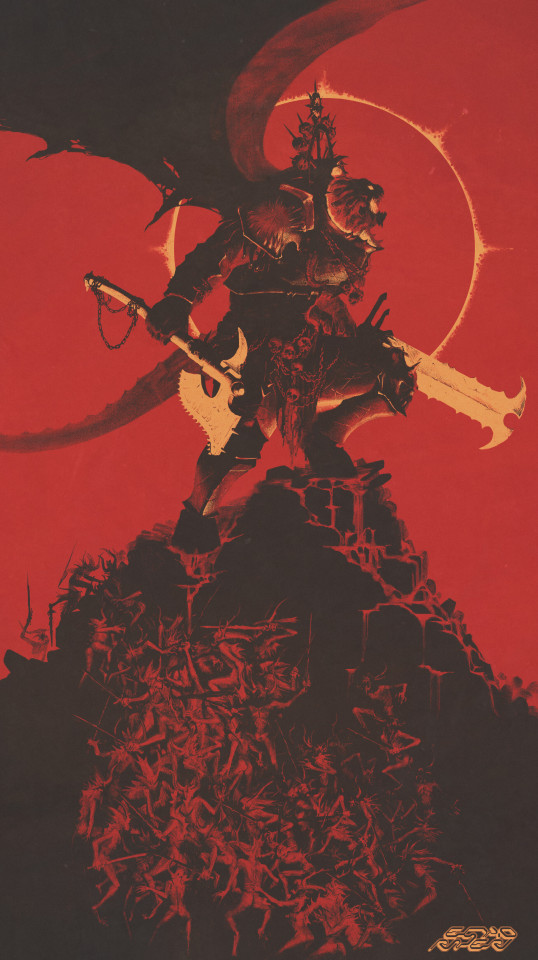
Angron: Red Angel
by Alfie Garland
956 notes
·
View notes
Text
uh...Odo is way more terrifying in the books just fyi

65 notes
·
View notes
Text
SARRYA THE UNSTOPPABLE, KHORNE BERSERKER: SCRIBBLE GUIDE

separate pics
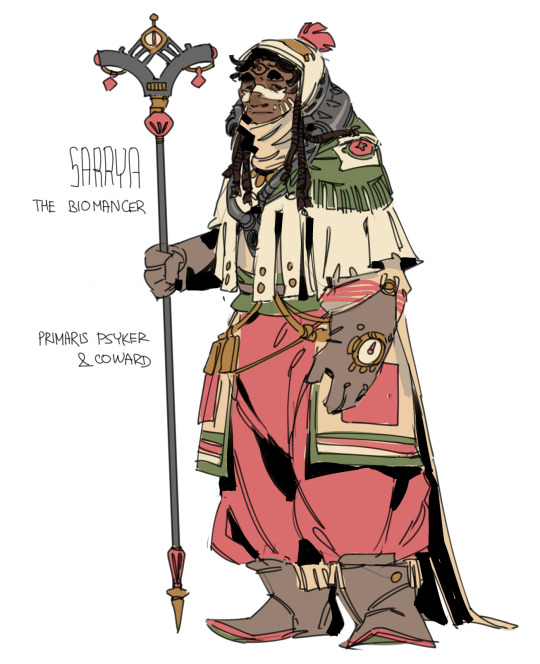



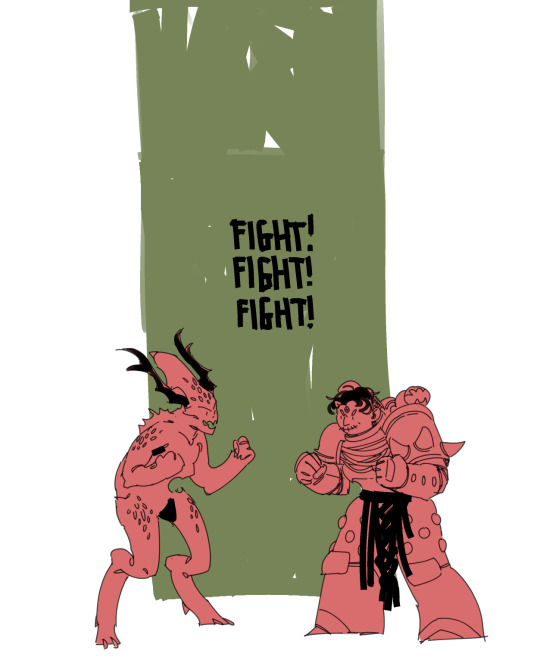


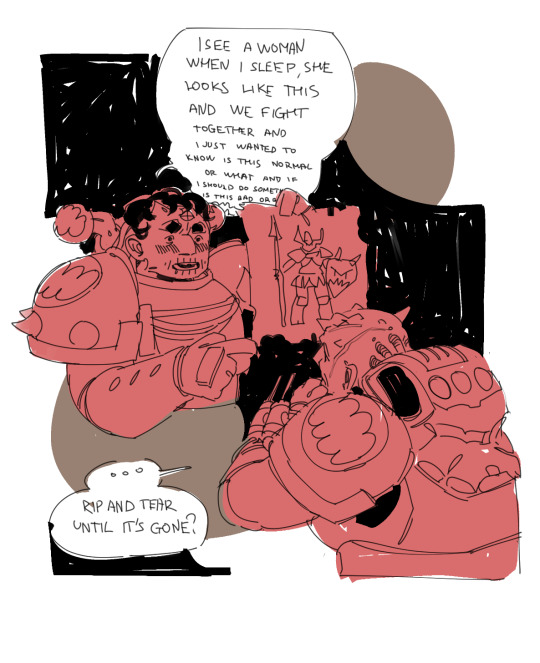
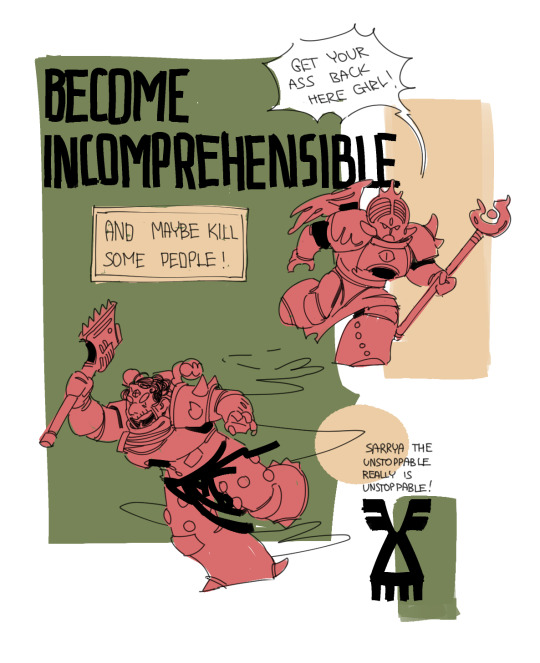
#art#sarrya#warhammer 40k#wh40k#warhammer 40000#wh40k art#khorne#world eaters#bloodletter#khorne berserker#female space marines#female astartes#plasmdraws#plasmomemes
757 notes
·
View notes
Text



Abyssal Bloodletter | A fiery heart tainted by violence. Test design, uninked
104 notes
·
View notes
Text

Finished the first one, working on a daemonette next.
The daemonette will have six plushies, and I don't know who or what she should be holding. Feel free to give suggestions!
#not fnaftale#warhammer 40000#warhammer 40k#warhammer#warhammer fanart#bloodletter#flesh hound#sleepy chaos#khorne
28 notes
·
View notes
Note
You know what we need? Batfam Bloodbourne au
Preferably where they're all sent to The Dream but separately and when they all kill gherman and become baby great ones they come back to Gotham and it's Their Dream now. Just Gotham or the world and Gotham is Home and the most like Yharnam, up to you. But I'd love to see them struggle through the brutality, or make peace with it quickly for some (in my mind Tim would be the most stable, Jason would be okay but not great, Tim just seems so,,, adaptable to me, the most insatiable for knowledge so the most accepting of the consequences of getting that knowledge, pros outweigh the cons kinda deal) with the way others were changed and just unsavable. The people of Yharnam are beasts now and the kindest way to deal with them is to put them down even if it's not permanent. And then come out of it irrevocably changed themselves, more than just mentally. The effects it has on them and the world around them. How The Dream ended, but theirs just began and what if it starts in Gotham and slowly spreads? But they're the only great ones in this world so there's no old blood to corrupt people but that doesn't stop death being...odd. Unless they share their blood in experiments to Know what it would do and if they can use it safely for those they care about. (mad scientist Tim my beloved)
Do you see my vision? It's beautiful
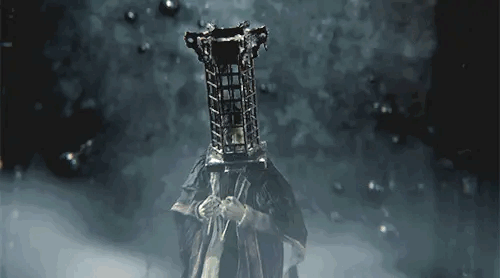
It's wonderful.
Like no joke, I adore Bloodborne, I Love it (Even if I can't play it thanks to getting distracted by all the details in the surroundings & then get murdered lol)
And I wouldn't say Tim is the most adaptable, they all are, but Tim? Compartmentalizes, looks at things logically, straight up turns off his panic at times like it's a switch. But I am also very weak to mad scientist Tim. Even if they probably don't let him do human experiments (not that it stops self-experimentation sometimes)
Gosh I love this. Them still ending up found-family while these utterly horrible things happen around and to them. I wonder if they sometimes take a moment in the dreams and whisper about what they remember before this Living Nightmare. Names they don't know the faces of but know they were important to them. Memories they cling to as they try not to lose what is left of their humanity.
Oh my god, them being the only Great Ones after killing the previous ones? Wonderful idea, I adore it. I bet even if they can take human form still it would be... off. And the more one's Insight is? The more they can see that they're Other.
God the imagery of like, Gotham's moon always being red and thick fog settling across the city each night as their Dream begins is amazing. And I bet that they relish it. I bet they're relieved for normal murder and crime, compared to the Plague of Beasts they had been dealing with what felt like years. Time gets so meaningless with an Endless night full of Deaths over and over.
I bet Gotham looks even more Gothic than before. Actually, you know what? This would be perfect for a No Man's Land situation. For the city to be abandoned only to be held afloat by newborn Gods who no longer quite understand the humans, not with how long the Hunt has stretched on, but care all the same. Idk I just really like this idea in general lol. I am weak to eldritch AUs and Bloodborne is glorious.
#ask answered#Bloodborne Au#batman au#batman#dc#dcu#cryptid batman#cryptid batfam#batfamily#cryptid batfamily#I wonder if Tim has a few birds he fed his blood#I wonder if x-ray machines would show their heads Lined with Eyes#I wonder if cameras don't show the human forms but glimpses of something Other#God i love the hunter's armors and weapons and everything#Oh my god would this mean Batman- they all deserve trick weapons but does this mean batman has a big fukin axe#I fully believe Dick would have something like the bloodletter#Damian has the chikage probably#hyperfixation no don't make me obsess over this-#Bus seriously gimme more ideas please I adore this#bloodborne#bloodborne crossover#bloodborne au
127 notes
·
View notes
Text
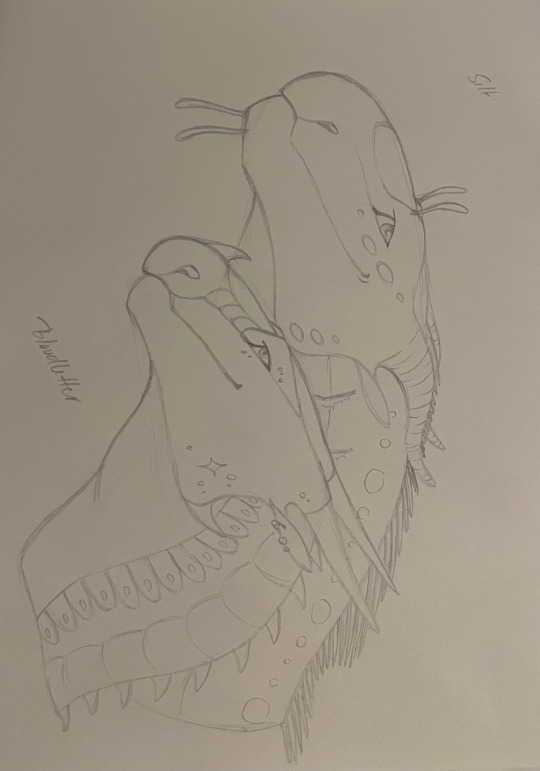
#nightwing#wof#wof oc#creatures#seawing#mudwing#skywing#art#Silt and Bloodletter#She met him on a trip to the sea#I love the barbels (?) of seawings
61 notes
·
View notes
Text
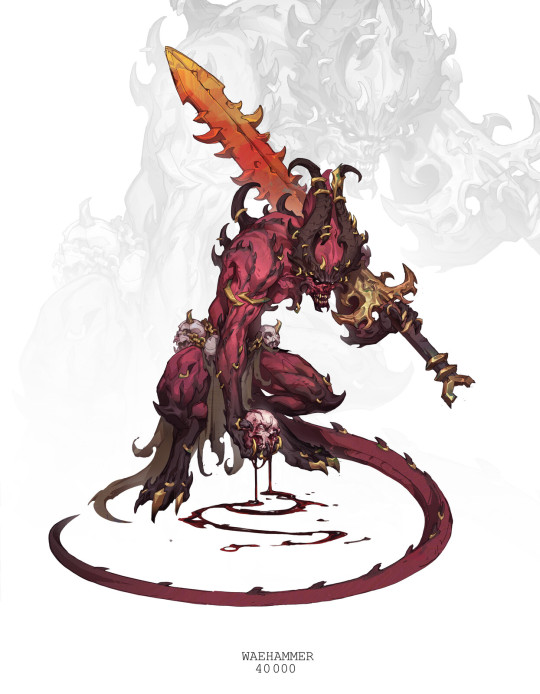
by haoyuan li
#warhammer 40k#daemons of chaos#khorne#blood for the blood god#skulls for the skull throne#bloodletter of khorne
136 notes
·
View notes
Text
Court chapters 48-51



Click to see the rest of the snark & image descriptions




Chapter 48
So I do, more than a little surprised that I haven’t done so already. And that’s when hell really breaks loose.
Chapter 48 summary: Hudson is naturally worried that if Grace touches the string that ties Cyrus to the gargoyles, that Grace will be poisoned. The bloodletter says that Grace has been poisoned since she was conceived… but it’s only her demigod bloodline that’s keeping her alive from it. And also the reason why Cyrus’s bite didn’t kill her.
As the three of them go to do this, the bloodletter tells them that she’s stopped time EVERYWHERE so that Grace can do this. But Hudson standing around and asking more questions is wasting time.
So Grace starts to try and connect with them. After the second attempt, Alistair mentally joins her, and keeps yelling out encouragement. And I think that my long-time followers know what I’m going to say about this endless scene: I don’t mind it, but it goes on for way too long. We’re on page ~260 of 949! Brevity is the soul of wit, and I don’t think the author has ever learned that.
Chapter 49
“Any closer and I’d have had an icicle through some things that icicles should never, ever go through.”
I think the author was aiming for indicating Flint’s penis, but like… Icicles should probably never go through ANY part of your body.
“Then again, you and I rarely see eye to eye on anything, do we, Cassia?”
Chapter 49 summary: In her mental struggle to connect with the gargoyles, Grace touched the green demigod string inside of her. When she released it at the end of the previous chapter, the world violently shook. This chapter was everybody dodging the rocks and ice that Grace accidentally sent scattering.
After the world calmed down, the bloodletter fixed everything with her powers, so it’s like it never happened.
Chapter 50
Surprise registers in the Historian’s eyes, followed quickly by annoyance. And then he snaps his fingers. And Hudson disappears.
Chapter 50 summary: Randomly, this guy shows up in the bloodletter’s cave. For the first time in three books, we get her name, which is Cassia. This dude's name is Jikan, and he has pierced nipples. (A fact that the narration reminded us of TWICE.) He is literally the god of time, and he is there to fix Grace’s “latest mess”. It takes way too long to get to this singular point, but what else is new in this book? When Hudson insists that he’s going with Grace, Jikan makes him disappear.
Chapter 51
The Historian grins, and somehow it’s even scarier-looking than his frown. “You’ll see.”
Chapter 51 summary: Grace threatens to touch her green demigod string again if Jikan won’t bring Hudson back. So he does.
He then pulls out some knitting needles and proceeds to knit strands of time together. While listening to a One Direction song. However, it’s only the chorus over and over. So even Grace is annoyed by it by the time he’s finished.
However, Grace is one of three people who can see the finished product, and all of her friends are baffled by the entire thing. Jikan warns her that she shouldn’t touch it, or else they’ll get broken again. And then he kind of pizza-tosses it up into the air, and tells them to wait and see.
#Crave series#Court (Crave 4)#chapter 48#chapter 49#Chapter 50#Chapter 51#Hudson Vega#Grace (Crave)#the bloodletter#Alistair (Crave)#Flint (Crave)#use your words#plot? what plot?#brevity is the soul of wit
0 notes
Text
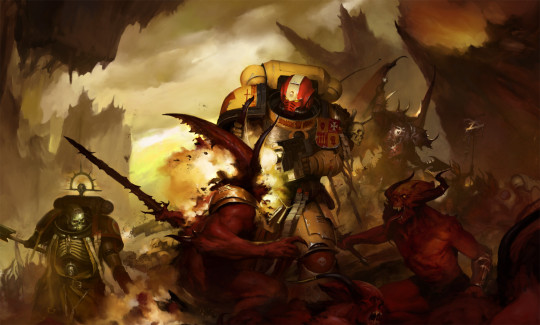
Imperial Fists vs Khorne Daemons
by Igor Sid
#imperium#adeptus astartes#astartes#imperial fists#chaplain#chaos#khorne#daemon#bloodletter#bloodthirster#bolter#battle#igor sid#40k
90 notes
·
View notes
Text
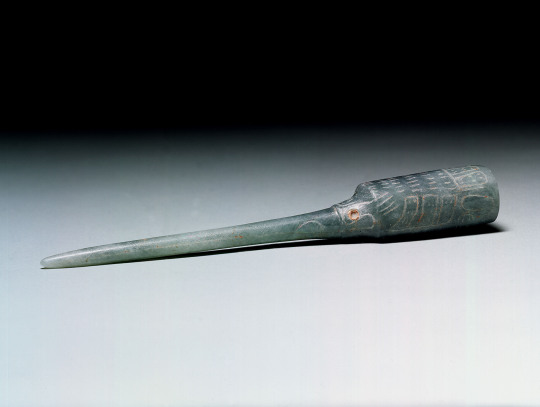
Hummingbird Bloodletter
Olmec, Middle Preclassic, 900-300 BCE
The act of bloodletting played a central role in the rituals of many ancient Mesoamerican cultures. In a typical bloodletting ritual, rulers or ritual specialists cut or pierced their ears, cheeks, tongues, or genitals. In representations of these rituals, the drops of blood are collected on papers in a basket, presumably to be burned later as an offering or communion with the gods. Although our most abundant evidence for bloodletting comes from the later Maya and Aztec cultures, this practice can be traced back in time to the Pre- Classic period and, in the case of this object, to the Olmec culture.
112 notes
·
View notes
Text

⥈ 𝕿𝖍𝖊 𝕭𝖑𝖔𝖔𝖉𝖑𝖊𝖙𝖙𝖊𝖗, 𝖕𝖙 𝟏 [𝖙𝖍𝖊 𝖈𝖗𝖚𝖉𝖊𝖘𝖙 𝖔𝖋 𝖗𝖊𝖎𝖓𝖙𝖗𝖔𝖉𝖚𝖈𝖙𝖎𝖔𝖓𝖘 𝖆𝖓𝖉 𝖌𝖆𝖒𝖊𝖘]
Aemond Targaryen x Reader/fem!OC | Daemon Targaryen x Reader/fem!OC
X: There is a dark soul in the Red Keep who toys with the strings of fate and tampers with the bonds it holds. She frays at its edges, knowing that with a simple word she could sever it entirely. Aemond has found a soul that mirrors his, and she fills the cracks in his core with molten gold. Though he isn't the only one who craves the solace she provides - or the pleasure she withholds.
Note: This has been edited into third person omniscient, and the word count has been doubled. I think it's safe to say I should stick to what I know lol
Word count: 2,2k
PREVIOUS | NEXT

It was a curious silence that fell over the Small Council whenever she arrived. Queen Alicent who, even in her youth, never looked at Lethira without suspicion eyed her as she sat down, claiming the seat that normally would have been claimed by Lord Corlys. Her lips formed into a bloodless line.
The pangs of sour memories had yet to cease their needle-like assault on Alicent’s chest. Every time Lethira would appear, all she saw was the same grin – the same, conniving smirk – that plagued her youth. Rhaenyra was her friend, but Lethira was far from it. And while their interactions back then were never purposefully unpleasant, it was almost as if Lethira knew things, had intentions, that Alicent was always painfully aware of. For whatever reason, Rhaenyra was not. And if she was, she either ignored it or welcomed it. Alicent never knew which.
Alicent saw. It was impossible not to. She saw the inevitable effect Lethira had on those around her. They all turned. They all stared. The attention could have been ignored, but it was the way her childhood ghost somehow made the room turn cold while setting it ablaze with her words. No one knew how to challenge her, for when they tried, it was in vain. She was too cunning. She held thoughts and opinions that silenced even the Hand of the King.
"Lethira," Alicent said her name with a heavy sigh. Regardless of her worries, she still found a way to hold herself strong. She would not have a cold memory from her youth plague her life as a queen. "I understand Small Council is still very new to you. However - "
"- I am well aware of when the Council meets, Your Grace." Lethira's response was quick and sharp, not with the preciousness of adolescence, but with the certainty of a dark chill. "I am here as a courtesy to inform you I cannot stay today. I have other pressing matters to attend to."
"And what -"
“Perhaps, you should consider installing one of your sons in my place of this Council if you are in need of a body to warm a seat.” Lethira cocked her head to the side, her legs crossed one over the other in a manner that allowed her black gown to expose the faintest flash of skin. She loved these silent battles with Alicent. The way her brow would twitch with concern. It was the same, even back then.
Alicent had no time to argue before she stood with a facetious curtsy.
It had not been long since Lethira's arrival that she started to pick away at the many shadows that haunted the Red Keep. Some shadows, however, followed closer than others.
Daemon, sly as ever, always seemed to be around every corner with his signature grin. If Lethira spoke and consequently removed the tongue of a curt Lord with a single word, he would smile again. He kept his distance – only barely. And when he didn’t, the conversations always teetered on something she recognized as playful teasing. It was a foolish attempt to understand her (and her motives), and yet she welcomed it all the same.
How entertaining.
“Avoiding your duties again, little serpent,” Daemond appeared just as the doors to the Council shut behind her. He tilted his head towards her with his eyes narrowed as if he still had not grown used to the image of Lethira as a woman and not a girl. “Lord Corlys might think you absent in his place.”
Lethira enjoyed the way he looked at her. Yes, it was a face and an expression she recalled from her youth, but it was also the same way he looked at Rhaenyra. Whether he was aware she saw it (even if Rhaenyra didn’t), she didn’t care.
“Alicent has done her duty to keep me mute. She needs a seat filled and sees no use for my opinion no matter how rooted in logic it may be.”
“So, I am correct. Loose loyalty does not suit a Lady, Lethira.”
She leaned in close until the scent of leather and sea salt trickled over her cheeks. Daemon didn’t back down, maintaining his composure in the face of her firm stance. Lethira parted her lips, just enough for him to see her tongue run across her teeth.
“Am I still a ‘little serpent’ to you, Daemon?”
There was a flicker – only barely noticeable – to flash across his face. A young Rhaenyra challenged him in similar ways, but as the years passed, there had been no other to speak to him in a way that felt like it was laced with fire. The low rumblings of her taunting turned his lips upward, and cast his gaze down to exposed flesh below her collar. Supple and rosy, he wondered if she tasted just as sweet.
Lethira took two steps back with her hands folded behind her back. She tilted her chin down, looking up at him through midnight lashes. “There is no loyalty in that council. Only rigid greed.”
“And do you not also feel the euphoric sting of greed?” Daemon chuckled. The scent of her sweet perfume beckoned him closer, but he stood firmly. “I thought I knew you better.”
“I do not feed the greed of others, my Prince,” she whispered, lips puckering ever so slightly. “Only my own. I suppose you and I are alike in that way.”
“Always the fire-starter.” He raised his head. “You always were a dangerous one.”
“One of us must hold the flame to the throne. Now that the Princess shares your marital bed, I see that your light has dimmed. She always did pull your attention. Whether or not I burned just as brightly back then will always be a mystery to you. I am not snuffed out so easily.” Lethira's gaze shifted. “Unless you believe that your nephew carries the torch where you cannot. Maybe his flame matches mine.”
There it was again – the flicker – except now it was the distinct sign that she'd hit a nerve. Daemon’s jaw tightened, and his grin faltered. He hated mentions of Aemond, and Lethira knew. The one-eyed prince was the only other shadow she cared to notice, and whatever attention she paid to him irked Daemon in ways that amused her. It wasn’t a matter of seeing who would fight for her. She wanted to know who would break beneath her pretty fingers.
Who would break, who would break first, and who would shatter.
The trysts with Daemon never ended with a farewell. By now Lethira grew used to simply walking past him, and always, she felt his eyes follow like a predator learning the habits of small prey.
This was the new game, and she learned to play it well.
⥈⥈⥈⥈⥈⥈
The hours of politics wore Lethira down just enough to the point where her mask faltered. It was only then that she excused herself, and she always managed to evade her escorts no matter how hard they tried to follow. She walked slowly throughout the Keep. The moon rose high above the courtyard, and the Lords and Ladies retreated to their chambers. It was only the King’s Guard that remained, and when their eyes traced the line of her waist, she would glance – only once – and force them back to attention.
Lethira walked on until she found the room she often found the most solace – or perhaps, the most entertainment.
Aemond stood with his back to her, hands clasped behind him as he looked out over the bay. His silver hair glinted in the moonlight, his posture rigid as always. Lethira leaned lazily against a marble column, watching him with a sly smile—like a dragon on watch that knew exactly how much her presence unsettled him.
Another game.
This was of a different kind than the one she played with Daemon. So different, and yet so much sweeter. Aemond’s silent anguish and curiosity tasted like liquid frost while Daemon’s felt like a blistering fire. Where Daemon’s stare followed her in the open, Aemond’s followed in secret. She wanted to tug at him if only to see where he’d bend. Where would he fold – would he fold at all? The fall was inevitable. From her brief time in King’s Landing, Lethira observed what others overlooked. He was far more pensive than most, and he was seen as strong enough to be left alone by the Queen.
What a waste, she thought. He was yet another dragon trapped in a prince’s mortal cage. Something about his latency intrigued her.
"Still brooding, Aemond?" Lethira teased with her voice only loud enough for him to hear. "You'll bear a hole in a moon if you stare at it any harder."
He turned his head slightly. "And what brings you skulking out here, Lethira? Tired of the revelry already?" His voice was low, calm—dangerously so. With Aemond, every word felt like a sword piercing the fragile veil of fabric on skin, honed to precision.
She stepped closer, her silk gown rustling softly against the stone. "You of all people would recognize a skulk. I needed a moment away from dull courtiers and their duller politics."
His lips curved into the faintest hint of a smirk before disappearing back into his stoic facade. "Funny. I thought you thrived on politics. And the subtle prying of men’s faults."
"I do," she admitted, her gaze flickering over him like a cat sizing up its prey. "But I find this much more interesting."
Aemond shifted, his intense gaze locking onto hers. "Do you enjoy this? Pretending like our meetings are a coincidence?"
"Perhaps it is just a coincidence. Isn’t that why I have your favor," she countered smoothly, closing the distance between them. "You like danger. And you crave control. It’s the uncertainty of knowing it is I who has the control that unnerves you."
A muscle in his jaw tightens, but his eye never left her, circling over the hint of a flush over her cheeks. "You think you know me so well."
"I do," she murmured. "Because I find myself... Intrigued. By you." Her voice softened, and in that brief moment, the mask slipped—just a little before she caught herself. The rigid wall returned quickly. "I simply wonder if we are allies... or enemies."
Aemond’s breath caught—just for a second, almost imperceptible. "And what would you have us be?" he asked quietly, his voice edged with something dangerous. Desire, perhaps. Or regret.
Lethira leaned in, lips brushing just close enough to be felt without touching. "Depends," she whispered. "What are you willing to give me?"
His hand snapped out, catching her wrist—not harshly, but with enough force to make her heart skip. For a moment, they were locked in a silent standoff, the tension between them a live wire.
His grip said, You won’t control me.
Her unflinching stare replied, Watch me try.
And then, just as quickly, he let her go.
“Do you grow tired of toying with my uncle already?” The venom flowed freely in Aemond's voice. Just as Daemon detested his name, Aemond loathed Daemon’s. The constant push and pull over – not only the power in the realm – but over who had the least amount of stakes in this game with Lethira. Aemond wouldn’t dare sit to wonder how invested he was – or if he was invested at all. Something about her and the way she spoke unnerved him, but the rumblings in his chest told him this was not the fear he had grown to tame into force. This was something entirely different.
“And why does my time with Daemon bother you so?” Lethira hummed a low sigh as she slowly circled around him. “He sees me as the image of the girl Rhaenyra was, only now a woman. My time away from King’s Landing allowed me to grow. Not change. I do not control the urges of a tempted man. You give me too much credit.”
"You think too highly of yourself, Lethira," Aemond murmured, though his eye lingered on her a moment too long.
She stopped in front of him and tilted her head, a slow smile spreading across her lips. "Perhaps. Or maybe you don’t allow yourself to think highly enough of me."
Aemond stepped back, giving her space—but not before brushing his fingers along hers, the briefest, most deliberate of touches. It was a warning. And a promise. She wondered if that was all the indulgence he could stand to allow himself. That was all he allowed himself to give to her – a touch. How long before he crumbled before her and gave more?
"You’ll have to work harder than that," Aemond whispered.
Lethira's smile deepened, the challenge sparking something electric in her veins. "Good," she purred. "If you made it too easy, I would’ve grown tired of you."
Aemond gave her one last look, something dark and unfathomable swirling in his gaze. And then, without another word, he turned and disappeared into the shadows, leaving her standing alone beneath the stars.
But she didn’t mind. Not one bit. Because she knew—this is just the beginning.
#house of the dragon#hotd#aemond targaryen#aemond#aemond one eye#hotd aemond#prince aemond targaryen#fanfiction#fanfic#daemon targaryen imagine#daemon#hotd daemon#daemon targaryen#aemond x reader#daemon x reader#The Bloodletter lunarflux#Lunarflux
23 notes
·
View notes
Text
I just realised I never gave any good photos of all the bloodletters, hang on.
First my armies on parade submissions.
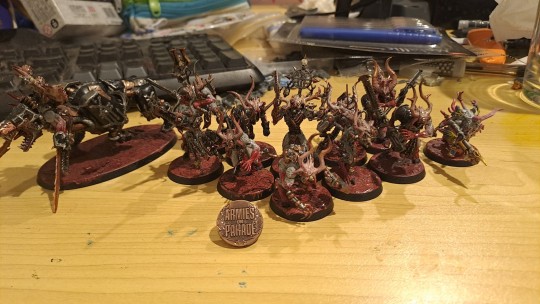
Then we got the comand trio (musician, banner/icon, and leader)
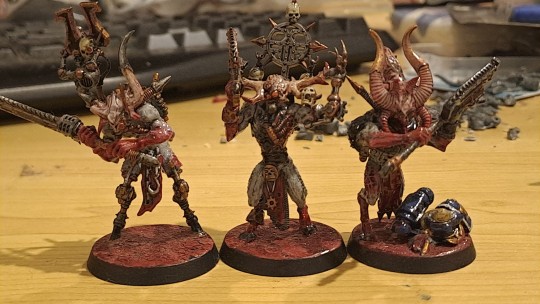
Four more freaks.
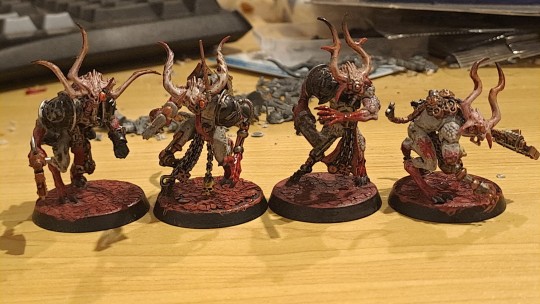
And the tree who we don't trust to hold their weapons, so we attached them.
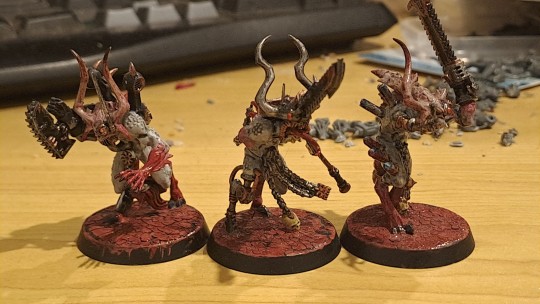
And then the paint scheme test for the blue horrors, and a test daemonette.
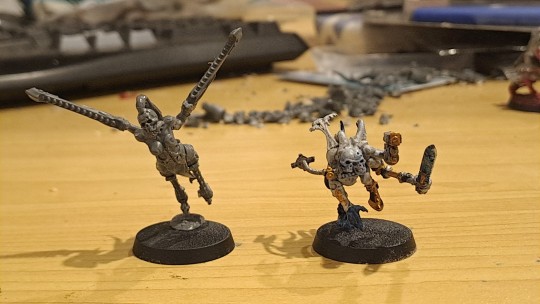
I'm thinking to build more daemonettes and fix up the pink and blue horrors tomorrow as a stream, I'll post an announcement or something if I do.
Also a vague plan I have for this is to finish up infantry for the main four gods, plaguebearers last, and a possible toss up between flesh hounds, blood crushers, or a great unclean one.
#warhammer#kitbash#miniature#miniatures#miniature painting#warhammer 40k#daemons#update#pink horror#bloodletter#blue horror#daemonette#chaos#chaos daemons#my art
26 notes
·
View notes